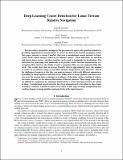Deep Learning Crater Detection for Lunar Terrain Relative Navigation
Author(s)
Downes, Lena M.; Steiner, Ted J; How, Jonathan P.
DownloadAccepted version (3.489Mb)
Open Access Policy
Open Access Policy
Creative Commons Attribution-Noncommercial-Share Alike
Terms of use
Metadata
Show full item recordAbstract
© 2020, American Institute of Aeronautics and Astronautics Inc, AIAA. All rights reserved. Terrain relative navigation can improve the precision of a spacecraft’s position estimate by providing supplementary measurements to correct for drift in the inertial navigation system. This paper presents a system, LunaNet, that uses a convolutional neural network to detect craters from camera imagery taken by an onboard camera. These detections are matched with known lunar craters, and these matches can be used as landmarks for localization. The motivation for generating such landmarks is to provide relative location measurements to a navigation filter, however the details of such a navigation filter are not explored within this work. Our results show that on average LunaNet detects approximately twice the number of craters in an intensity image as two other intensity image-based crater detectors. One of the challenges of cameras is that they can generate imagery with vastly different appearances depending on image qualities and noise levels. Differences in image qualities and noise levels can occur for reasons such as changes in irradiance of the lunar surface, heating of camera electronic elements, or the inherent fluctuation of discrete photons. These image noise effects are difficult to compensate for, making it important for a crater detection system to be robust to them. Convolutional neural networks have been demonstrated to be robust to these kinds of imagery variation. LunaNet is shown to be robust to four types of image manipulation that result in changes to image qualities and noise levels of the input imagery.
Date issued
2020-01Department
Massachusetts Institute of Technology. Department of Aeronautics and AstronauticsJournal
AIAA Scitech 2020 Forum
Publisher
American Institute of Aeronautics and Astronautics (AIAA)
Citation
2020. "Deep Learning Crater Detection for Lunar Terrain Relative Navigation." AIAA Scitech 2020 Forum, 1 PartF.
Version: Author's final manuscript